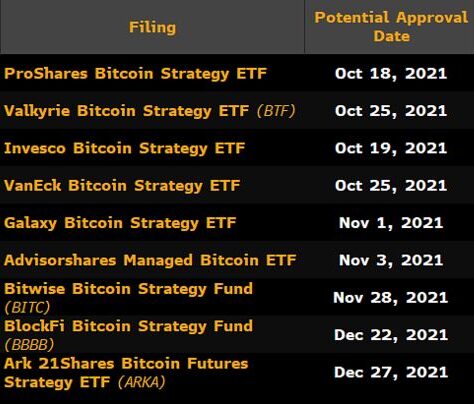The US Securities and Exchange Commission (SEC) has approved the Valkyrie Bitcoin Strategy ETF. This makes it the second futures-based Bitcoin ETF that will start trading after the SEC has given the first green light. How many will follow and is one of them going to be spot-based?
The US Securities and Exchange Commission (SEC) has approved yet another Bitcoin futures ETF, according to a notice published by the regulator. This exchange-traded fund (ETF) was proposed by Valkyrie, and it is alredy trading on the Nasdaq. The Valkyrie Bitcoin Strategy ETF will trade under the ticker of BTF and most likely won't be the last ETF approved by the SEC.
More ETFs waiting for approval

The arrival of more ETFs will give a greater swathe of investors the ability to gain exposure to Bitcoin and other cryptocurrencies. So far, only futures-based bitcoin ETFs have been approved in the Unites States, with Ether-ETFs also in the pipeline. Firms offering these ETFs have been racing to be the first one approved, which some analysts believe would give it a strong advantage. Still, there is no dearth of ETF proposals, and many are still applying to get a share of the pie.
The cryptocurrency market has come a long way since its early days, and the trading of ETFs signals a landmark moment for the market. It will not be long before more ETFs begin to fill the market, which bodes well for the asset class.
High demand for bitcoin fund
The Valkyrie Bitcoin Strategy ETF will be the second BTC futures ETF to start trading, after the highly successful launch of the ProShares Bitcoin ETF. ProShares drew in over 24 million shares on its first day of listing with a daily trading volume of over $1 billion. These funds will be lapped up by a broader audience, many of whom have waited on a more regulated crypto investment vehicle before entering the market.
SEC Chair Gary Gensler has offered tentative support for futures-based ETFs, though the fate of others remains uncertain. Many investors have been hoping for a spot-based bitcoin ETF, as the nature of futures-based funds can lead to below-average performance compared to the underlying. Two of the largest proponents of a spot-based ETF have been crypto trust issuer Grayscale and asset management giant Fidelity.








